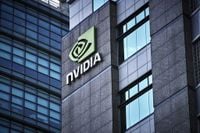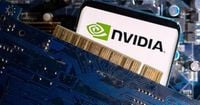On April 15, 2025, Nvidia, the U.S. semiconductor giant known for its dominance in artificial intelligence (AI) technology, announced a significant shift in its export strategy due to new regulations from the U.S. government. The company revealed that it would require export licenses for its AI-oriented semiconductor product, the H20, designed specifically for the Chinese market. This announcement comes with a hefty price tag, as Nvidia expects to record a loss of up to $550 million (approximately 79 billion yen) in its financial results for the February-April 2025 period.
The notification from the U.S. government, received on April 9, indicates that the new export regulations will be applied indefinitely, raising concerns about the potential military applications of Nvidia’s technology in China. The H20, which has been designed with reduced performance to comply with existing regulations, was previously approved for export to China but is now caught in the tightening web of U.S. export controls.
In after-hours trading on April 15, Nvidia's stock plummeted by approximately 6%, reflecting investor concerns over the implications of these new regulations. The company’s announcement highlighted that the $550 million expense relates to H20 inventories and purchase commitments, which are now impacted by the licensing requirements.
The H20 semiconductor is critical for AI applications, as it supports the acceleration of learning and inference processing. The U.S. government has expressed concerns that these products could potentially be diverted for use in Chinese supercomputers, which could have implications for national security.
Bloomberg Intelligence analysts, including Kunjian Sobhani, have projected that the financial impact of these regulations could lead to a revenue loss of between $1.4 billion and $1.8 billion for Nvidia over the full fiscal year. This is a significant blow for a company that holds approximately 80% of the market share in AI-oriented semiconductors and has been experiencing rapid growth due to the generative AI boom.
Nvidia's sales to China account for over 10% of its total revenue, which means the new export regulations could severely hinder the company’s growth momentum. The firm has been riding high on the wave of AI advancements, but the tightening of U.S. semiconductor export regulations presents a formidable challenge.
In response to the new regulations, Nvidia is forced to reassess its product lines and strategies to adapt to the changing landscape of international trade. The company had recently announced a plan to invest up to $50 billion in AI infrastructure within the United States, aiming to bolster its domestic capabilities in the face of growing restrictions abroad.
The implications of these new regulations extend beyond Nvidia. Competitors in the AI semiconductor market, such as Advanced Micro Devices (AMD), also saw their stock prices decline in response to the news, indicating a ripple effect throughout the industry.
Despite the challenges posed by the U.S. government's export regulations, Nvidia continues to innovate and adapt. The company has been at the forefront of AI technology, and its products are integral to various sectors, including gaming, data centers, and automotive applications.
As the geopolitical landscape continues to evolve, the intersection of technology and international relations will likely shape the future of companies like Nvidia. The U.S. government's decision to impose stricter export controls reflects broader concerns about technology transfer and the potential for dual-use applications in military contexts.
In conclusion, Nvidia's announcement of the new export licensing requirements for its H20 product marks a significant turning point for the company and the broader semiconductor industry. As it navigates this complex regulatory environment, the implications for its financial performance and strategic direction will be closely watched by investors and industry analysts alike.







